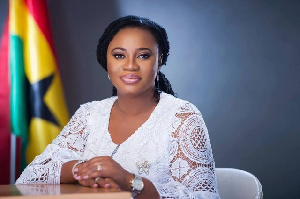 Former chairperson of the Electoral Commission, Charlotte Osei
Former chairperson of the Electoral Commission, Charlotte Osei
Former Chair of the Electoral Commission of Ghana (EC), Charlotte Osei, has said that any reforms or policies that seek to widen the space for inclusiveness should be accepted by all Ghanaians.
She added that policies that also seek to make the people feel a sense of ownership of Ghanaian institutions should also be embraced.
She said these when asked questions on some of the electoral reforms introduced by the current leadership of the elections management body, while speaking on Joy News Wednesday, August 18.
“My view is that any policies or any reforms that widen the space, that creates new avenues for inclusiveness, that create avenues for transparency should be embraced.
“My view is that anything that makes us feel as citizens in the sense of ownership of our own institutions and create accountability by appointed or elected officials of state should be encouraged.”
The EC has made a number of reform proposals for elections in Ghana.
These include “We propose closing the polls at 3 pm rather than 5 pm. In 2019, we announced our decision to close the polls at 3 pm rather than 5 pm, in the 2020 Elections.
“Nonetheless, owing to the COVID-19 pandemic and the stringent, and necessarily time-consuming safety protocols we instituted at our polling stations, we were compelled to put this proposal on hold. Over the past months, however, this proposal has re-surfaced from various sections of the public, and indeed, our own experience from the 2020 Elections has revealed that it is a workable proposal, as, by 1 pm, most polling stations were empty, suggesting that this is a workable proposal. Therefore, this is a reform we intend to put forward.
“Again, we propose to do away with the system of periodic nationwide registration exercises and institute an all-round system where citizens who turn 18, or persons who have not previously registered, may visit any district office with their Ghana Card or passport and register as voters.
“This will help us do away with nationwide registration exercises and go a long way to reducing the cost of elections.
“We further propose a year-round exhibition system that will enable citizens to check their registration details on their smartphones and other mobile devices.
“Citizens would not need to wait for an exhibition exercise to check their details. They will be able to do so, all year round.
“We propose to build further efficiency into our collation process by focusing on data entry only at the Constituency Collation Centre. The entry point for data capturing into the system will be at the Constituency Collation Centre.
“The data i.e. Constituency Collation Results will be made available to all stakeholders at the Regional and National levels. Flowing from the data captured at the Constituency Collation Centre, the system will generate regional and national reports without further data entry at any of those levels.
“By adopting this system, the problem of minor inaccuracies with the collation process and unnecessary delays will be reduced significantly,” she said.